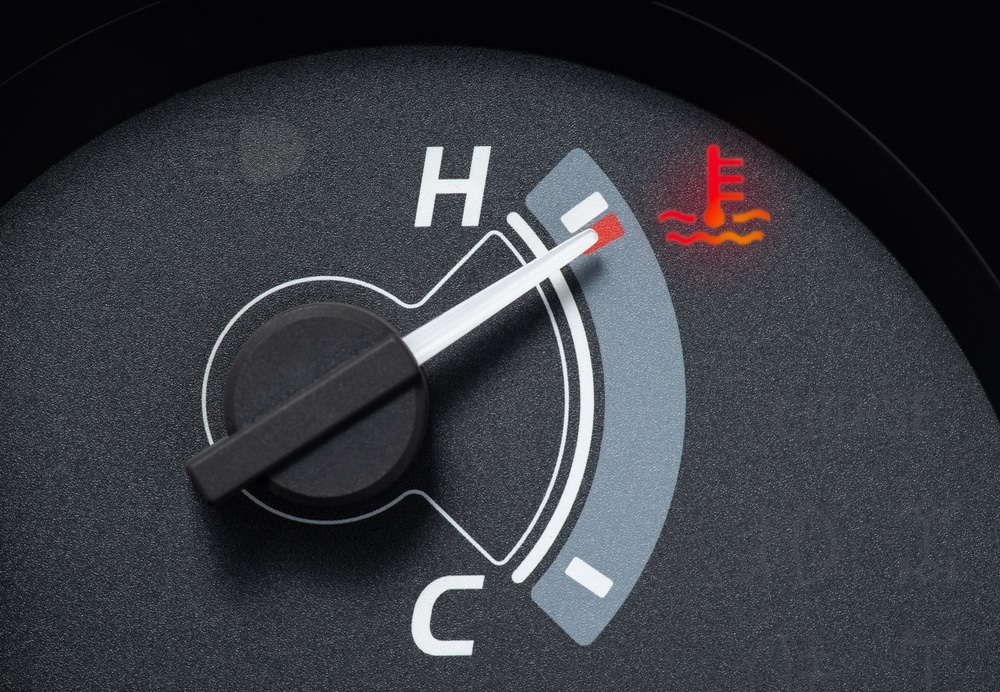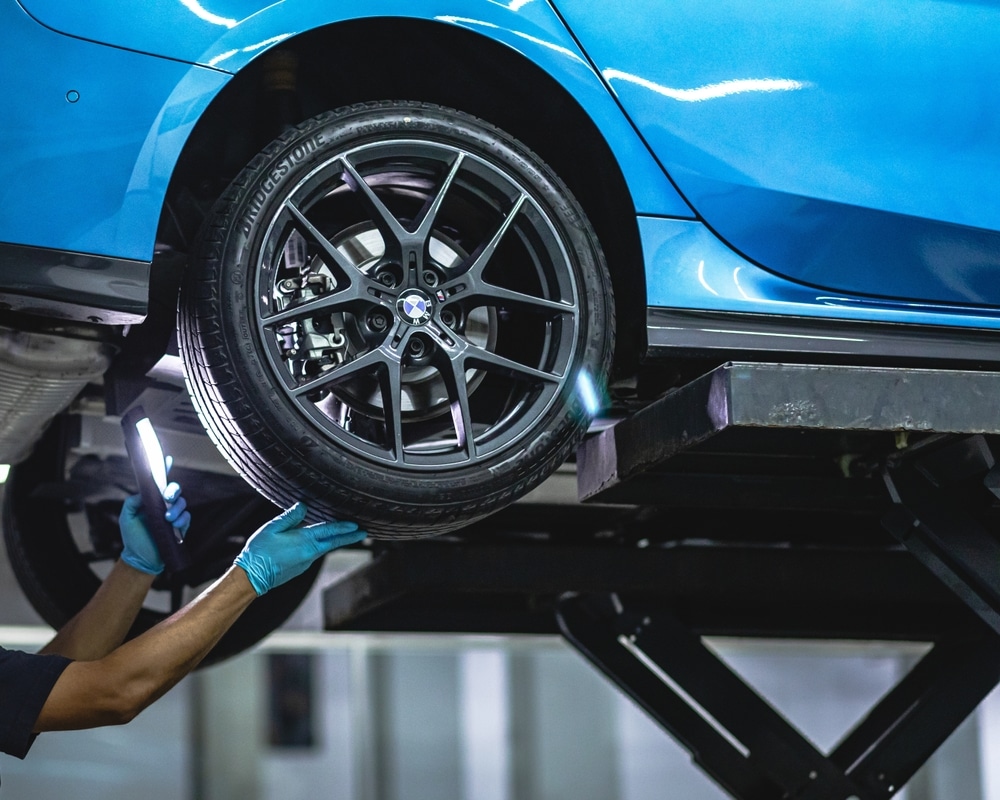BMW Overheating
Overheating poses a significant risk to any vehicle, affecting its overall performance, longevity and safety. It’s also a fast track to expensive repairs, which we’d all rather avoid.
Unfortunately, every vehicle can suffer from this problem, even your BMW.
To help you understand the issue and the steps you can take to keep it at bay, our experts at Roade Main Garage have created a complete BMW overheating guide.
Here’s what you’ll discover inside:
- The common reasons behind BMW overheating
- How your BMW’s cooling system works
- Professional advice on maintenance to steer clear of overheating issues
Whether you’re a seasoned BMW driver or considering joining the club, this guide provides crucial tips to prevent your BMW from overheating and what to do if it does.
Is your BMW suffering from an overheating problem? Our team of BMW experts at Roade Main Garage can help. Call our team today for all your BMW needs.

Common Causes of Overheating
There are many reasons why your BMW may overheat. At Roade Main Garage, some of the leading causes we see are the following:
- Insufficient coolant levels: Essential for removing heat, a car can overheat if its coolant is low due to leaks or evaporation.
- Radiator issues: Reduced cooling efficiency from blockages, leaks or damage to the radiator can cause your engine to overheat.
- Malfunctioning thermostats: An improperly opening thermostat can impede coolant flow, overheating the engine.
- Water pump malfunctions: This critical component circulates coolant. If it fails, the engine’s temperature management is compromised, resulting in overheating.
Specific BMW models, mainly from certain production years, could be more susceptible to overheating, primarily due to production or design flaws. An older car or one with significant mileage is also at a greater risk of overheating.
By addressing any overheating issues quickly, you can protect your BMW from severe engine damage.
The best way to prevent your vehicle from overheating is with regular maintenance. Regular maintenance allows us to spot warning signs early before they escalate.
To schedule a service and keep your BMW running cool, contact Roade Main Garage today.

Cooling System Overview
Your BMW’s cooling system is crucial for keeping your engine’s temperature at optimal levels.
Here’s a brief overview of its operation:
- Coolant Fluid: Absorbs engine heat and is cooled down in the radiator
- Radiator: The heart of your BMW cooling system, it dissipates heat from the coolant
- Water Pump: Powered by your vehicle’s engine, it circulates coolant throughout your BMW’s engine and the radiator
- Thermostat: Regulates coolant flow to maintain consistent engine temperatures
- Hoses: Serve as pathways for coolant to move between the radiator, engine and water pump.
Our expert team at Roade Main Garage have decades of experience working on all BMW models. We’ve got the skills, experience and know-how to keep your BMW’s cooling system in peak condition, ensuring your vehicle doesn’t overheat.
What Common Problems do the Radiator, Water Pump and Thermostat Have?
Maintaining an efficient cooling system is critical to prevent your BMW from overheating. If any of your cooling system’s parts fail, it can lead to your vehicle overheating.
Here are some issues your cooling system may experience:
- Radiator: This component cools the engine by transferring heat from the coolant. Problems like leaks, blockages or a defective radiator cap can lead to inadequate cooling and overheating.
- Water Pump: A vital part for circulating coolant around your engine, ensuring it stays cool. Issues might include coolant leaks or odd noises, indicating a failing pump.
- Thermostat: Manages coolant flow to keep engine temperature steady. A faulty thermostat may result in poor engine performance and overheating.
While these issues can occur, they can be avoided with regular checks and maintenance. Such as:
- Monitoring coolant levels regularly
- Inspecting your cooling system for leaks
- Listening for any unusual engine noises
- Keeping an eye out for performance issues
Have you noticed any of these problems? Contact Roade Main Garage today for expert assistance in maintaining your BMW’s cooling system.
How Do You Check for Coolant Leaks?
Coolant leaks are one of the leading faults that cause overheating in BMWs. Watching for signs of leaks can help you catch them early, potentially saving you from significant damage.
Keep an eye out for these indicators:
- Puddles beneath your car
- A distinct, sweet smell resembling syrup
- A noticeable decrease in coolant levels without obvious reasons
If you encounter any of the above issues, it’s crucial that you act fast. The longer you leave the problem, the worse it will become and it could leave you with severe engine damage and a large repair bill.
Call our experts at Roade Main Garage today for a quality fix.
The Best Maintenance Practices
Ensuring your BMW’s cooling system operates flawlessly is essential for preventing overheating. The following maintenance strategies can help:
- Coolant Flush: Periodically changing the coolant in your BMW helps ward off corrosion and prevent debris buildup
- Hose Inspection: Regularly examine your vehicle’s cooling system hoses for signs of deterioration, like cracks or signs of leakage
- Radiator Maintenance: Keep your radiator clean and ensure it’s free from any blockages or damage that could impair its function
These maintenance practices enable you to spot any issues early, protecting you against overheating and costly repairs down the line.
How Do Your Driving Habits Affect Overheating?
One of the most significant factors that can cause your BMW to overheat is the way you drive. Certain driving habits can put your vehicle at a higher risk of overheating.
- Aggressive Driving: Frequent speeding and abrupt acceleration can make your BMW engine to work harder and generate more heat, increasing the likelihood of overheating.
- Heavy Loads: Carrying excessive weight forces the engine to exert more effort, raising its temperature and the chance of overheating.
If you want to lower the chances of your BMW overheating, you can adjust your driving slightly, such as:
- Smooth Driving: A more relaxed and gentle driving style can greatly reduce your risk of overheating.
- Taking Breaks: On longer journeys, allowing your vehicle to rest periodically lets the engine cool, maintaining a safe temperature range.
If you need help with a BMW overheating problem, our experts at Roade Main Garage are always on hand to help.
What To Do If Your BMW Overheats
Discovering your BMW is overheating can be alarming. If you notice dashboard warnings, an unusual smell, smoke under your bonnet, or a sudden drop in performance, follow these immediate actions:
- Switch off the air conditioning and turn up the heater. Although odd, this action can help draw some of the heat away from the engine.
- Find a safe place to pull over and stop. It’s crucial to halt your vehicle safely to avoid further damage.
- Turn off your engine to allow the car to cool down. It’s important to wait until your BMW’s engine has cooled before opening the bonnet to prevent the risk of burns.
- When it’s safe, check the coolant level and top it off if necessary. This might serve as a temporary fix if low coolant is the issue.
- If the problem persists, it’s vital to seek professional assistance. Speak to our BMW specialists at Roade Main Garage for expert support with your BMW’s overheating issues.
How Much Can Overheating Cost?
When your BMW overheats, the financial impact depends on the severity of the damage or problem.
Expenses might vary from something minor, such as replacing a thermostat or replenishing coolant, to more extensive repairs, like fixing or replacing the radiator water pump or addressing engine damage.
We recommend calling our experts at Roade Main Garage for a precise quote.
How Do I Keep Repair Costs Down?
If you’re wondering how you can keep costs down, there are several steps you can take:
- Adhere to your BMW’s maintenance schedule, focusing mainly on the cooling system to ensure it’s functioning correctly.
- Keep an eye on coolant levels, checking and refilling as needed.
- Regularly inspect hoses and belts for signs of wear and tear, which could indicate potential cooling system issues.
- Drive carefully to reduce unnecessary stress on your vehicle, especially under hot conditions or when carrying significant weight.
- Don’t overlook signs of overheating; ignoring them can lead to more severe, costly engine damage over time.
At Roade Main Garage, we always provide you with a quality fix for better-than-dealership value. This saves you money and ensures your BMW receives the level of care needed to keep it in peak condition.
Whether you’ve got the stylish M4 or the family-friendly X5, our experts are prepared to tackle any cooling system challenges.
Call Roade Main Garage today for all your BMW overheating issues.




